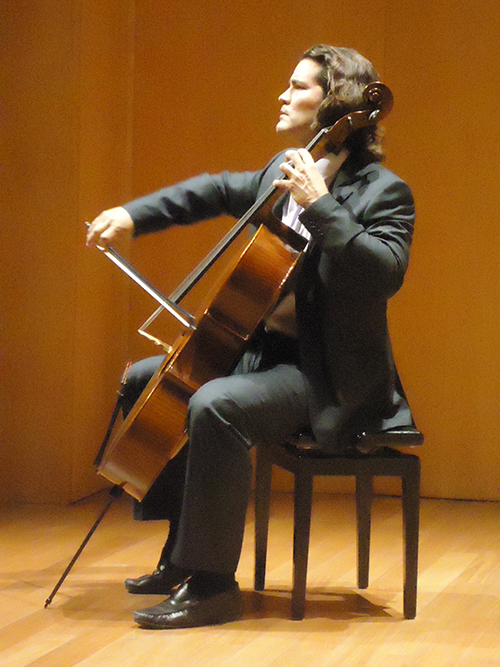Bailey’s shimmering Dutilleux highlights Boston Philharmonic program

Zuill Bailey performed Dutilleux’s “Tout un monde lointain” with Benjamin Zander and the Boston Philharmonic Thursday night at Sanders Theatre.
Zuill Bailey had always wanted to play the Dutilleux cello concerto.
The popular cellist has performed some of the grandest concertos in the repertoire as well as a host of new music. But the Dutilleux piece, known for its extreme difficulty, was off limits for him as most conductors refused to program it.
That changed this season when Benjamin Zander offered Bailey to chance to perform the concerto with the Boston Philharmonic. Thursday night at Sanders Theatre. Bailey and the ensemble delivered a commanding performance of this infrequently performed work.
The concerto, titled Tout un monde lointain, reflects five poems by Charles Baudelaire. It comprises a world of shimmering sounds. The music changes shape on a dime, pulsing with energy in some places and weeping in others. The harmonic writing is colorful but occasionally bristly, falling somewhere between Debussyian elegance and the Boulezian avant-garde. But there’s a warmth and humanity to Dutilleux’s style. At one point the orchestra sounds a chord built from all twelve pitches of the chromatic scale; the resulting music shimmers like light on water.
The concerto places unusual demands on the solo instrument, likely why Bailey broke a string in the middle of the first movement. After a quick fix, Bailey, Zander, and the orchestra picked up where they left off and gave a reading of fierce commitment that made the most out of Dutilleux’s occasionally sparse orchestration.
Bailey conjured a host of sounds from the cello. His playing ranged from glassy harmonics and ghostly slides to percussive pizzicatos. Yet the cellist performed with a remarkable sense of the melodic line. His tone was cool yet singing, like a voice in the wilderness. In response, Zander coaxed playing of delicate colors. The orchestra responded sensitively to make a strong case for a work that deserves to be heard more often.
The other large-scale piece of the evening was Elgar’s Enigma Variations.
The fourteen variations of this set, each depicting a friend of Elgar’s, are based upon a curious little theme. Elgar described it as “nothing—but something might be made of it.”
And indeed he does in a grand way. Variations are the simplest and most straightforward musical form yet they provided the vehicles for the composer’s rich imagination. Some of the pieces recall the yearning depths of Wagner’s style; others have the spinning lines of Brahms. Most, though, are imbued with an Edwardian swagger all Elgar’s own.
Zander led a performance of grace and character. The opening theme was shaped in soft arcs of sound. “Ysobel,” which depicts one of Elgar’s viola students, moved with spirited warmth. The first variation, which is a musical portrait of Elgar’s wife Alice, swelled in rosy phrases of orchestral color. The famous “Nimrod” was taken at a brisker pace than one usually hear, a choice that lent more nobility to the music than sadness. The finale is Elgar’s self-portrait, and with its lively quotes of “Nimrod” and Alice variations, it sounded with appropriate grandeur and pomp.
Fine playing also characterized Thursday’s performance of William Walton’s Scapino Overture.
Subtitled “A Comedy Overture,” this jocular work brims with excitement and the kind of motoric, athletic phrases that make up much of the British composer’s music. Zander’s account was abuzz with energy, with the brass and woodwinds engaged in bold playing. The schmaltzy cello solo that comes mid-piece, played by Rafael Popper-Keizer, was put across with dusky tone, making for a brief moment of nostalgia. The overture provided bright colors to the program. Perhaps Zander and the Boston Philharmonic can tackled one of Walton’s symphonies in the future.
For the opener, Debussy’s Prelude to the Afternoon of a Faun, Zander led a reading focused on the fine details.
Details aren’t necessarily important in Impressionism, but one couldn’t help but notice the velvety flute solo that opens the piece, the horn chords that glowed with warmth, or the silky quality of the strings in the glistening climactic points. The Boston Philharmonic sounded as good as it ever has, and one couldn’t have asked for a more colorful performance.
The program will be repeated 8 p.m. Saturday at Jordan Hall and 3 p.m. Sunday at Sanders Theatre. bostonphil.org
Posted in Performances